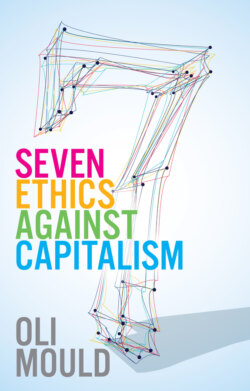Seven Ethics Against Capitalism

Реклама. ООО «ЛитРес», ИНН: 7719571260.
Оглавление
Oli Mould. Seven Ethics Against Capitalism
CONTENTS
Guide
Pages
Seven Ethics Against Capitalism. Towards a Planetary Commons
Acknowledgements
Introduction
The commons
A history of the commons
The planetary commons
Ethics
The Covid event
Organizing towards a planetary commons
Notes
Ethic 1: Mutualism
A history of self-interest
Neoliberalism
Mutualism
The science of we
Philosophical connections
Notes
Ethic 2: Transmaterialism
Veganism
Right to repair
Eco-squats
Notes
Ethic 3: Minoritarianism
Becoming minor(itarian)
Intersectionality
Staying minor
Minoritarianism
Notes
Ethic 4: Decodification
Codification: a philosophy of numbers
The quantified self
Bodily decodification
Urban decodification
Planetary decodification
Notes
Ethic 5: Slowness
Happiness
Slow media
Slow fashion
The power of the present
Notes
Ethic 6: Failure
Mind the gap
Queering success
Failure loves company
The failed state
Notes
Ethic 7: Love
Notes
Conclusion: The State of the Commons
— Happy New Year! —
An ethical summary
Notes
Index. A
B
C
D
E
F
G
H
I
J
K
L
M
N
O
P
Q
R
S
T
U
V
W
Y
Z
POLITY END USER LICENSE AGREEMENT
Отрывок из книги
‘Seven Ethics Against Capitalism sharply reveals the multiple crises being generated by the capitalist mode of production – from climate breakdown, to inequality, to the erosion of democracy – and how impossible it would be to fix any of these problems without a radical transformation in the way we organize society. Mould convincingly argues that values such as solidarity, stewardship and radical love must be at the heart of this new vision for the world, as well as the movements aiming to bring it into being.’
Grace Blakeley, author of Stolen: How to Save the World from Financialisation
.....
Furthermore, a planetary mode of organization recognizes our material and psychological intimacy with the planet as Gaia.22 As the philosopher Bruno Latour has argued, we need to ‘rematerialize our belonging to the world’.23 Within this process there is the necessity to resist totalizing narratives that reduce the heterogeneity of the world’s population into a single homogeneous entity. As Latour (among others) has continually stressed, the nature/culture divide is a false one, and attempts by culture to curb and control nature are at the root of capitalistinduced climate catastrophe. A planetary commons rejects this divide and calls for a ‘reterrestrializing’ of our existence in the world.24
Second and relatedly, in their conceptualization of the ‘planetary turn’, the scholars Amy Elias and Christian Moraru have argued that globalization is a totalizing and homogenizing force, one that is suspicious of difference as an inefficiency in the smooth functioning of global capital across the many parts of our world (i.e. the Bretton Woods institutions and their allocation of the ‘global commons’). Globalization is the creation and maintenance of the global scale that contains the flows of capital and the elite, at the expense of the nuances of the local. Globalization is a homogeneous force that seeks to annihilate difference. Instead, Elias and Moraru talk of planetarity or ‘worlding’ as something that focuses on relationality and, crucially, ethics. They argue: ‘Planetarity is configured – artistically, philosophically, and intellectually – from a different angle and goes in another direction [from globalization]. It represents a transcultural phenomenon whose economical and political underpinnings cannot be ignored but whose preeminent thrust is ethical.’25
.....